China's solutions to global challenges in tumultuous age
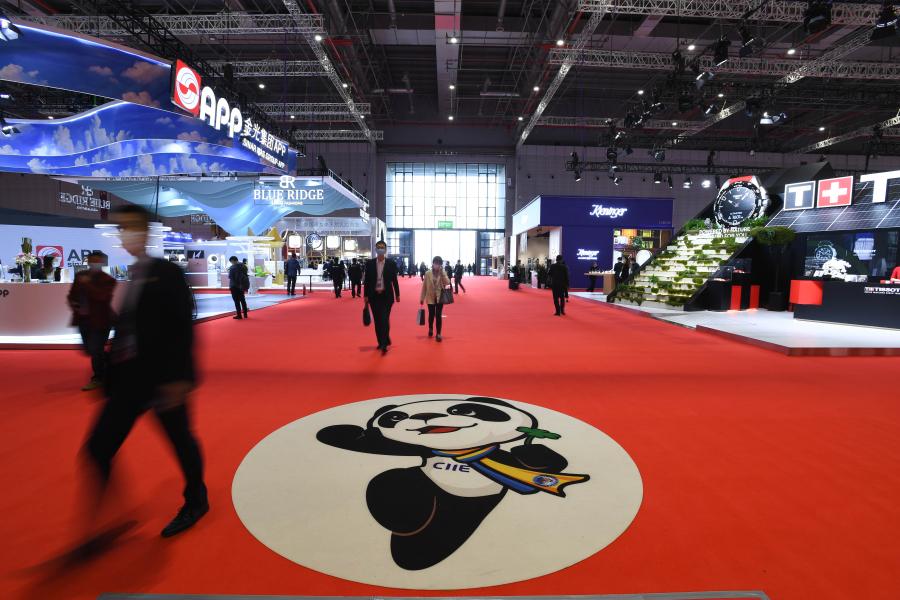
People visit the consumer goods exhibition area during the third China International Import Expo (CIIE), in east China's Shanghai, Nov. 10, 2020. [Xinhua/Li Renzi]
-- Four years ago, at the United Nations Office in Geneva, Chinese President Xi Jinping called for building a community with a shared future for mankind.
-- The vision has gradually transformed into a consensus shared by countries around the world amid growing global challenges.
-- As a firm proponent and practitioner of multilateralism, China has all along taken concrete actions to turn the vision into reality via win-win cooperation.
by Xinhua writers Luo Jun, Li Jun
BEIJING -- Pulling together to build a community with shared future for mankind, a historic and philosophical concept presented by Chinese President Xi Jinping, has gradually transformed into a consensus amid growing challenges worldwide.
Four years ago, at the United Nations Office in Geneva, Xi called for building such a community while expounding his vision of humanity's future.
The Chinese leader championed a world of lasting peace, common security for all and common prosperity, as well as an open, inclusive, and clean world. His vision was applauded more than 30 times by the audience in his 47-minute speech.
Four years on, in the shadow of the raging COVID-19 pandemic, with worldwide political and socio-economic challenges, Xi's concept has proven to be "the only future for humanity on this planet," as Peter Thomson, president of the 71st Session of the General Assembly, said.
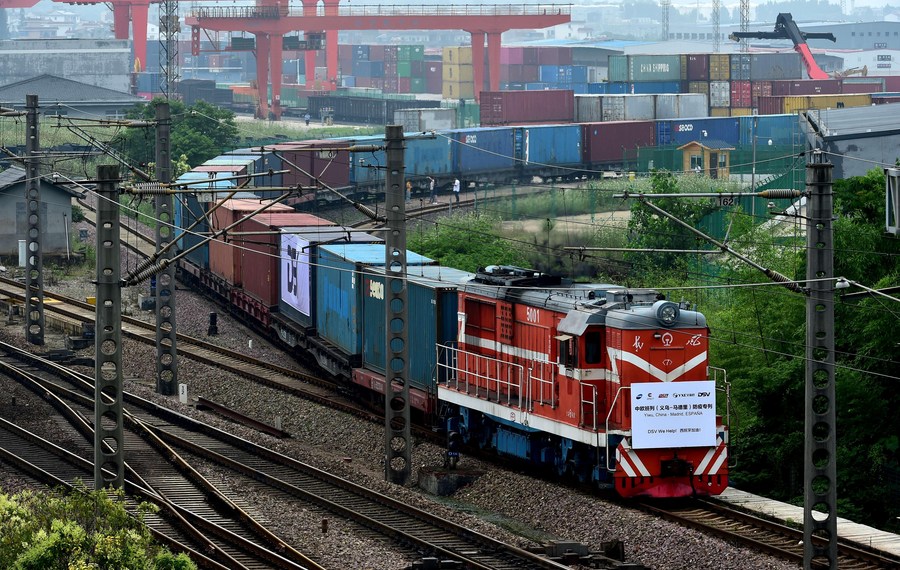
A China-Europe freight train carrying medical supplies bound for Madrid of Spain departs from the city of Yiwu, east China's Zhejiang Province, June 5, 2020. [Photo by Lyu Bin/Xinhua]
THE ANSWER
The novel coronavirus has infected close to 100 million people across the globe, taking over 2 million lives. The pandemic has not only exerted extreme pressure on public health systems worldwide, but also disrupted the normal political and economic order.
Amid the global crisis, hegemonism, unilateralism and protectionism loom over the world, which further threatens a post-pandemic future for humankind.
To unite or to separate? To open up or to exclude? To cooperate or to confront? The world is in a historic crossroads.
In his speech delivered at the Palace of Nations on Jan. 18, 2017, Xi listed such priorities as partnership, security, growth and inter-civilization exchanges in building a community of a shared future for humankind.
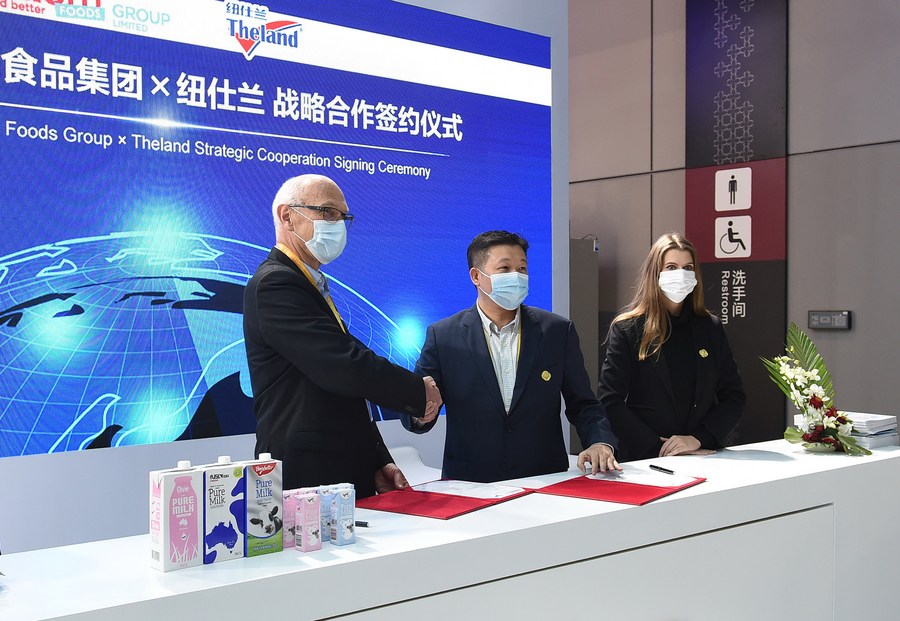
Roy Van Den Hurk (1st L), general manager of product with New Zealand dairy company TheLand, attends a cooperation signing ceremony during the third China International Import Expo (CIIE) in east China's Shanghai, Nov. 5, 2020. [Xinhua/Zhao Dingzhe]
Since 2013, when the Chinese president first presented the concept during a visit to Russia, Xi has enriched the concept to include building a shared future with neighboring countries, with Asia-Pacific partners, with African countries, with Latin American countries, and building a maritime shared future, as well as a shared future in cyberspace.
With the pandemic still raging, Xi put forward the proposal of jointly building a community of common health for humankind, calling for active engagement in jointly battling the pandemic and enhancing global public health governance.
China has initiated the largest global humanitarian efforts in its history, providing anti-epidemic aid to over 150 countries and 10 international organizations, and sending 36 medical expert teams to 34 countries.
"Coronavirus is a global crisis that no country is immune from. It has proved that building a community with a shared future for mankind is the only right choice to win the battle," said Stephen Perry, chairman of Britain's 48 Group Club.
"China's commitment to building a community with a shared future for mankind is one of the most beautiful philosophical concepts, and a magnificent Chinese initiative for the peace and well-being of peoples in history of humanity," said Pierre Picquart, a French expert on China at the University of Paris VIII.
CONCRETE ACTION
Though the COVID-19 pandemic has dealt a heavy blow to the world economy and added to its instability and uncertainty, China took innovative approaches to establish "fast tracks" and "green lanes" to ensure a smooth flow of personnel and goods and keep industrial and supply chains stable and open.
With containment protocols in place, China hosted a series of global trade events as scheduled including the 2020 China International Fair For Trade in Services in Beijing, the third China International Import Expo (CIIE) in Shanghai, and the 17th China-ASEAN Expo in Nanning, among others.
"This demonstrated China's sincere desire to share its market opportunities with the world to tide over difficulties," said Chen Fengying, a researcher at the China Institutes of Contemporary International Relations.
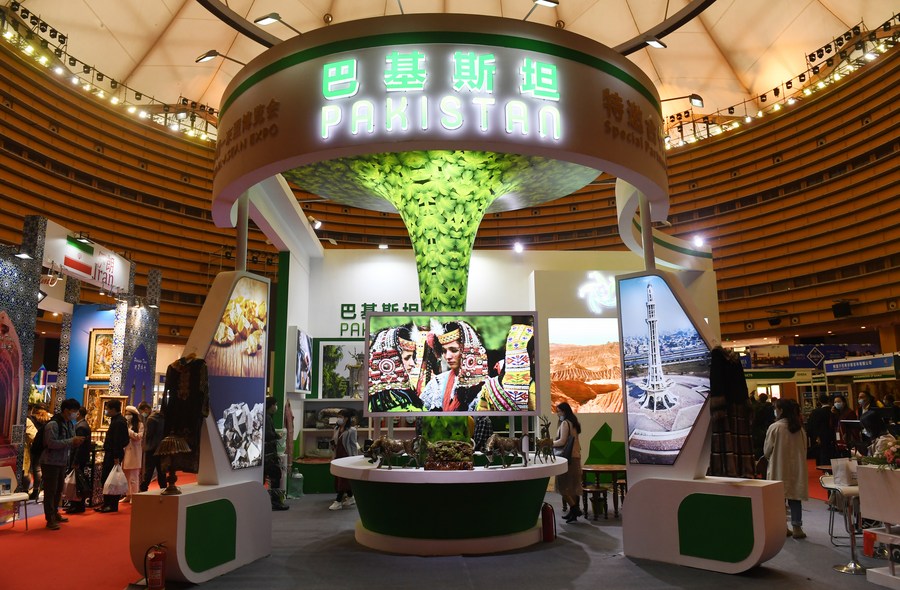
Photo taken on Nov. 28, 2020 shows a Pakistani exhibition area of the 17th China-ASEAN Expo at Nanning International Convention and Exhibition Center in Nanning, south China's Guangxi Zhuang Autonomous Region. [Xinhua/Lu Boan]
The CIIE provided growth opportunities for Roy van den Hurk, a New Zealand dairy company manager.
Joining the over 3,600 companies from over 150 countries and regions, it was the third consecutive year for Hurk's company Theland to participate in the CIIE, with the previous two resulting in increased product sales.
"I felt completely safe while at CIIE, and in fact I feel completely safe in Shanghai as well," said Hurk. "We are also very confident of the China market for many years to come." The company has already signed a three-year long-term participation memorandum with the organizers to secure a booth place at the next CIIE.
In his Geneva speech, Xi welcomed other countries "aboard the fast train of China's development." The Belt and Road Initiative (BRI), an important platform proposed by Xi in 2013, has been part of that drive.
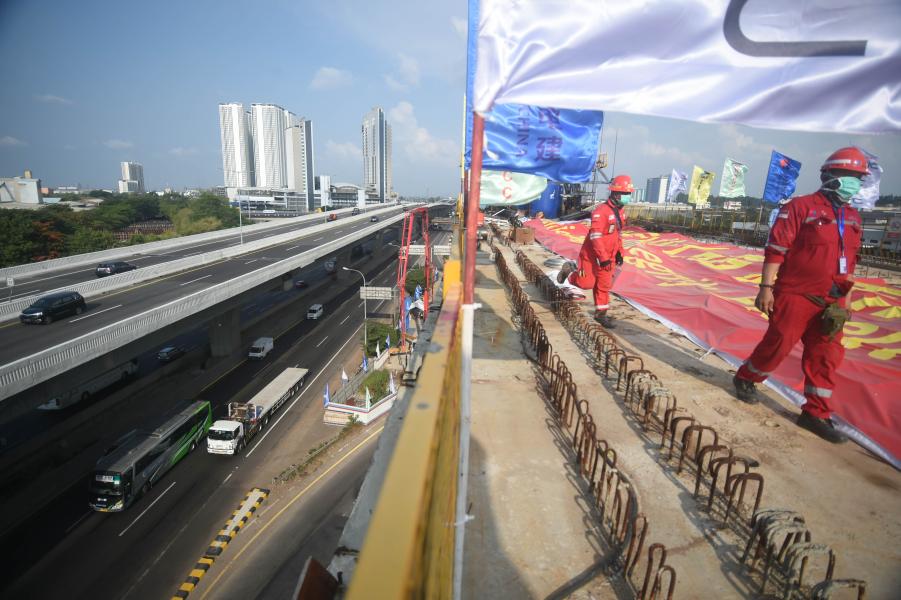
Workers walk on a continuous beam at the construction site of the China-built Jakarta-Bandung high-speed-railway in Bekasi, West Java province, Indonesia, Aug. 15, 2020. [Xinhua/Zulkarnain]
Despite the COVID-19 pandemic, BRI cooperation continues to bear fruit. In the first eight months of 2020, China's trade with Belt and Road partners reached 5.86 trillion yuan (about 896 billion U.S. dollars), and Chinese companies increased their non-financial direct investment in partner countries by more than 30 percent year on year.
The China-Europe freight train service network, a land transportation artery like a modern railway version of camel caravans across Eurasia, saw 10,180 trips made as of Nov. 5, 2020. Nearly 8 million parcels of medical supplies have been delivered via the network last year.
For Pakistani President Arif Alvi, the BRI has profoundly interpreted the true meaning of cooperation, peace and development and reflected the universal aspirations of people around the world.
NEW POSSIBILITY
No country in the world can enjoy absolute security while others remain in turmoil, Xi said at the Palace of Nations.
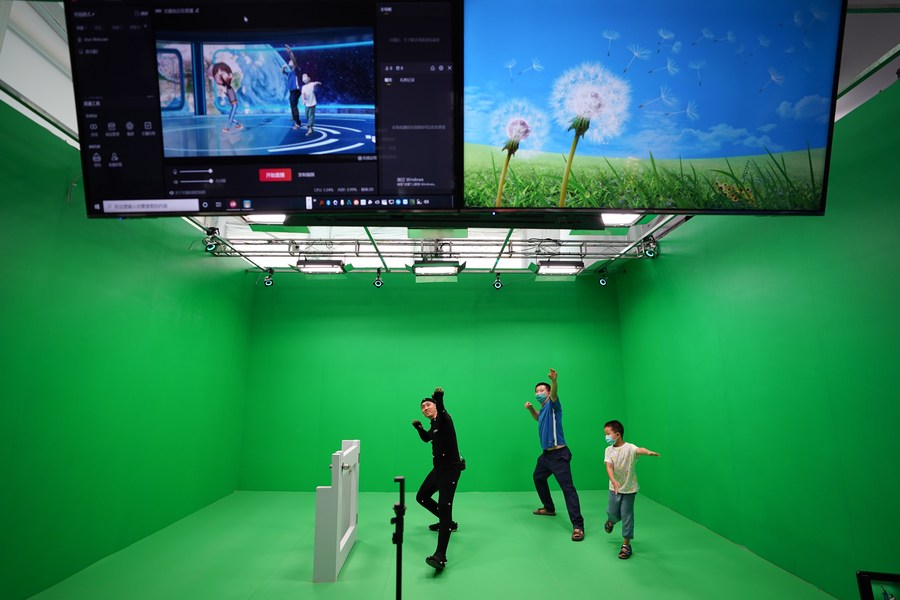
Visitors try a virtual reality (VR) product in the cultural services exhibition area of the 2020 China International Fair for Trade in Services (CIFTIS) in Beijing, capital of China, Sept. 5, 2020. [Xinhua/Ju Huanzong]
Xi delivered speeches at a series of United Nations high-level meetings marking the 75th anniversary of the founding of the 193-nation body.
The Chinese president called on all countries to abandon a zero-sum mentality and promote universal security, in line with his Geneva speech.
Green and low-carbon development and a coexistence between humanity and nature has long been a part of Xi's global vision.
China has announced that it would strive to peak carbon dioxide emissions by 2030 and achieve carbon neutrality by 2060. China has also pledged to lower its carbon dioxide emissions per unit of GDP by over 65 percent from the 2005 level, increase the share of non-fossil fuels in primary energy consumption to around 25 percent, and bring its total installed capacity of wind and solar power to over 1.2 billion kilowatts.
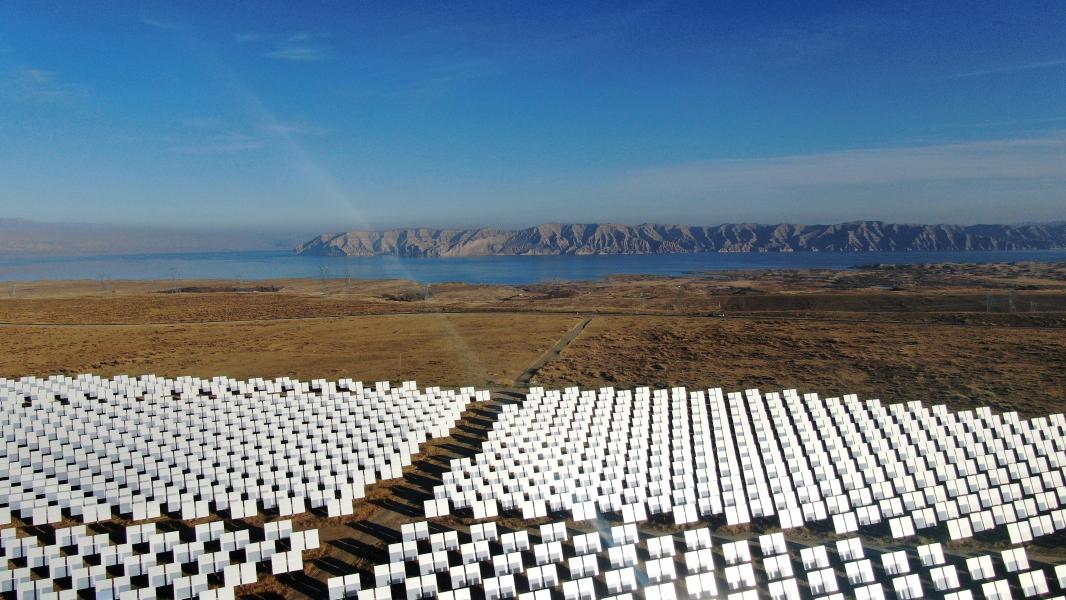
Aerial photo taken on Dec. 15, 2020 shows a solar thermal electricity project in Gonghe County, Tibetan Autonomous Prefecture of Hainan in northwest China's Qinghai Province. [Xinhua/Zhang Hongxiang]
China has not only made achievements in its own green development, but also shared its experience with other countries, said Nasser Bouchiba, president of the Africa-China Cooperation Association for Development in Morocco.
"A just cause should be pursued for the common good," Xi has quoted this Chinese proverb in many speeches. Traditional Chinese culture advocates "harmony in diversity" and upholds "the beauty of each civilization," which has become a gene deeply rooted in the vision of building a shared future for humankind.
However, major changes unseen in a century have given rise to profound changes in the international order. Some countries started to advocate the fallacy of a "clash of civilizations," "racial superiority" and "putting one's own country first" in an attempt to foster prejudice, estrangement and hatred.
Over the past four years, Xi has pointed out on many international occasions that diversity of human civilizations not only defines our world, but also drives humanity's progress. Civilizations are enriched by exchanges and mutual learning. "Only through mutual respect, mutual learning and harmonious coexistence can the world maintain its diversity and thrive," Xi said.
Martin Jacques, a senior fellow of politics and international studies at Cambridge University, said China has carried out unprecedented work at home and abroad and offered "a new possibility" to the world.
Xinhua correspondents Han Mo, Chen Shan, Jin Zheng in Beijing also contributed to the story.
























